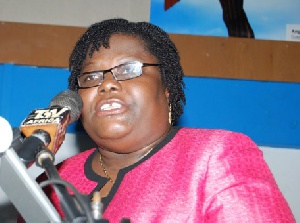Regional News of Saturday, 25 October 2014
Source: GNA
CEDAW commends Ghana
The 59th session of the United Nations Committee on the Elimination of Discrimination against Women (CEDAW) on Friday commended Ghana for contributing to global efforts towards eliminating gender-based discrimination.
Seasoned Ghanaians who have served CEDAW over the years include, Ms. Dorcas Ama Frema Coker-Appiah, Executive Director at the Gender Studies and Human Rights Documentation Centre in Accra, a non-governmental organization dedicated to promoting and protecting the rights of women in Ghana from 2007 – 2010.
Others are Ms. Charlotte Abaka, a gender advocate and Ms Hilary Amesika Gbedemah, a lawyer and gender consultant.
The committee members commended the country for its support over the years.
The CEDAW was adopted by the UN General Assembly in 1979 and is often described as an international bill of the rights of women.
The Committee seeks to monitor the implementation of national measures towards eliminating discrimination against women. It is empowered to make recommendations on any issue affecting women to which it believes the State parties should devote more attention.
Meanwhile, Ghana’s representatives including the Parliamentary Committee on Gender and Children; Ministers of State; and other gender stakeholders took turns to answer questions on policy issues, implementation strategies and impact on gender.
Nana Oye Lithur, Minister of Gender, Children and Social Protection has noted that Affirmative Action Policy formulated in 1998 by the Government after the Beijing Plan of Action, set targets of 40 per cent representation of women at all levels of governance, on Public Boards, Commissions, Councils, Committees and Official Boards including Cabinet and Council of State.
“As the country progresses towards meeting these targets, the trend has been mixed...in the traditional governance institutions efforts have been made to ensure the active participation of Queen-mothers in the Traditional Councils and Houses of Chiefs.
In other governance structures – particularly in political positions – women are still under-represented (Ghana MDG Report, 2013). Women, however, are still under-represented in key national and regional governance institutions,” she stated.
The Gender Minister said at the highest level of Government, women make up 29 per cent of Ministers, 23 per cent of Deputy Ministers, 16 per cent of Chief Directors and eight per cent of District/Municipal/Metropolitan Chief Executives.
She said within the judiciary, women still continue to lag behind their male counterparts in the superior courts there are 5 out of 13 at the Supreme Court 9 out of 26 at the Court of Appeal and 25 out of 103 at the High Court and 30 women parliamentarians out of 275.
Nana Oye Lithur said one of the key legislation that mandates the participation of women is the National Peace Council Act, which requires that one of the two members of the National Peace Council appointed by Government should be a woman.
Since 2002, various Governments have made efforts to increase women’s participation in the District Assemblies through administrative guidelines that require varied percentages of appointed members to be women.
Speaking on political participation Mr Kwesi Armo-Himbson, Chief Director Minister of Gender said the two of the country’s major political parties, the ruling National Democratic Congress (NDC) and the New Patriotic Party (NPP) have reduced the cost of filing fees for women parliamentary contestants.
“These political parties and others in the country have stated quotas for women’s ministerial appointments in their manifestoes,” he said in a response to a question from the Committee.
He said Civil Society Organisations including ABANTU for Development, Women in Law and Development (WiLDAF), and Action Aid-Ghana have carried out awareness-raising programmes and advocacy which have accounted for the marginal increases in women’s participation in decision-making at national and local levels.











